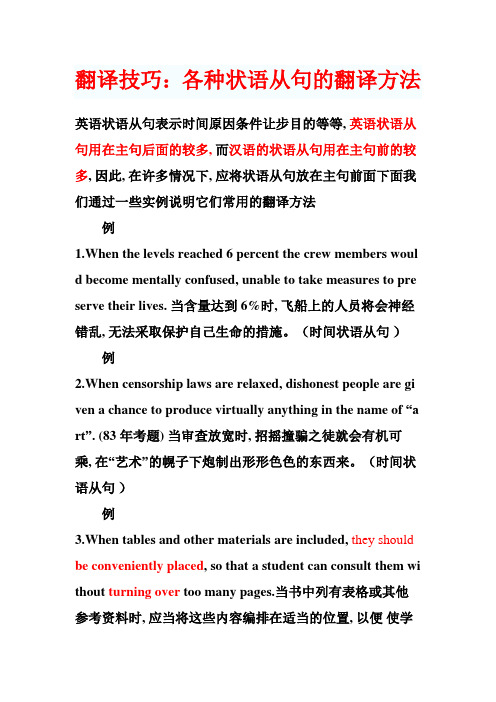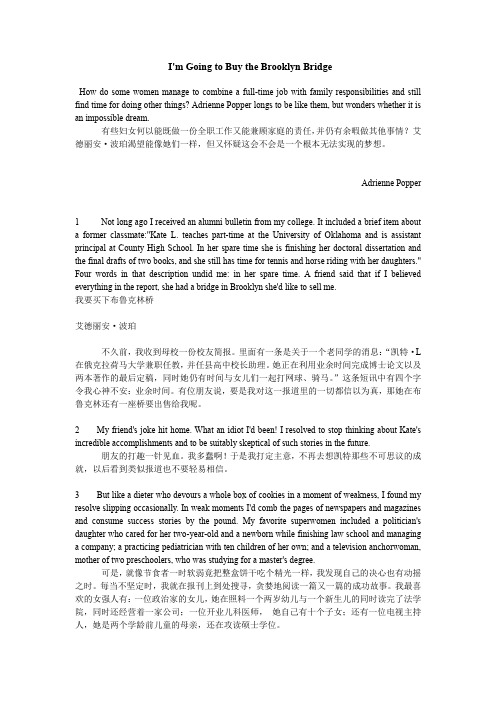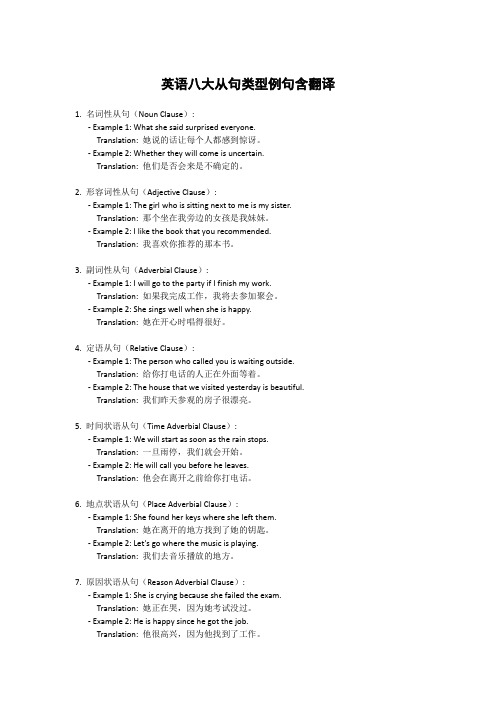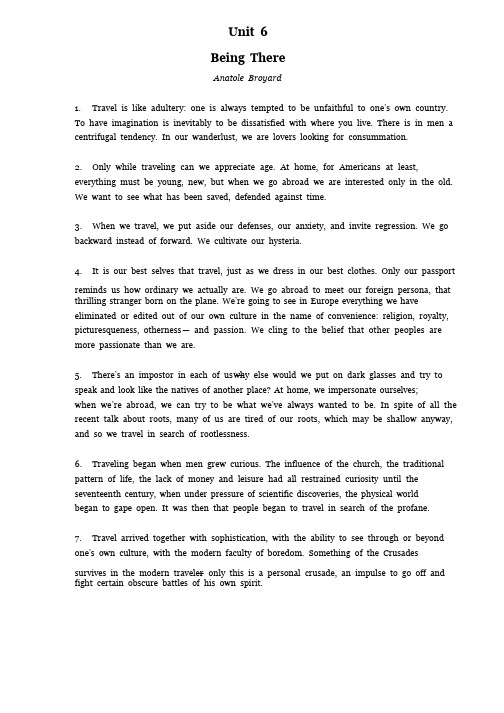Chapter 6 从句的翻译
各类状语从句的翻译技巧

翻译技巧:各种状语从句的翻译方法英语状语从句表示时间原因条件让步目的等等,英语状语从句用在主句后面的较多,而汉语的状语从句用在主句前的较多, 因此, 在许多情况下, 应将状语从句放在主句前面下面我们通过一些实例说明它们常用的翻译方法例1.When the levels reached 6 percent the crew members would become mentally confused, unable to take measures to pre serve their lives. 当含量达到6%时, 飞船上的人员将会神经错乱, 无法采取保护自己生命的措施。
(时间状语从句)例2.When censorship laws are relaxed, dishonest people are gi ven a chance to produce virtually anything in the name of “a rt”. (83年考题) 当审查放宽时, 招摇撞骗之徒就会有机可乘, 在“艺术”的幌子下炮制出形形色色的东西来。
(时间状语从句)例3.When tables and other materials are included,they should be conveniently placed, so that a student can consult them wi thout turning over too many pages.当书中列有表格或其他参考资料时, 应当将这些内容编排在适当的位置, 以便使学生在查阅时, 不必翻太多的书页。
(时间状语从句)例4.This happens when a fact is discovered which seems to con tradict what the “law” would lead one to expect. 每当发现一个事实使人感到与该定律应得出的预期结论相矛盾的时候, 就发生这种情况(时间状语从句)例5.Now since the assessment of intelligence is a comparative matter we must be sure that the scale with which we are com paring our subjects provides a ’valid’ or ’fair’ comparison. ( 92年考题)既然对智力的评估是比较而言的, 那么我们必须确保, 在对我们的对象进行比较时, 我们所使用的尺度能提供“有效的”或“公平的”比较(原因状语从句)例6.The policies open to developing countries are more limited than for industrialized nations because the proper economie s respond less to changing conditions and administrative con trol. 由于贫穷国家的经济对形势变化的适应能力差一些, 政府对这种经济的控制作用也小一些, 所以发展中国家所能采取的政策比起工业化国家来就更有局限性(原因状语从句)例7.For example, they do not compensate for gross social inequ ality, and thus do not tell how able an underprivileged young ster might have been had he grown up under more favorable circumsta nces. (95年考题) 例如, 他们(测试)并不对社会总的不平等作出补偿, 因此, 测试不能告诉我们, 一个社会地位低下的年轻人如果生活在较为优越的条件下, 会有多大的才能(结果状语从句)例8.It also plays an important role in making the earth more habita ble, as warm ocean currents bring milder temperatures to places that would otherwise be quite cold. 由于温暖的洋流能把温暖的气候带给那些本来十分寒冷的地区并使之变暖, 因此, 海洋在使我们这个地球更适合人类居住方面也扮演一个重要的角色(原因状语从句)例9.Electricity is such a part of our everyday lives and so much tak en for granted nowadays that we rarely think twice when we swi tch on the light or turn on the radio. (84年考题) 电在我们的日常生活中所占的地位是如此重要, 而且现在人们认为电是想当然的事, 所以我们在开电灯或开收音机时, 就很少再去想一想电是怎么来的(结果状语从句)例10.The first two must be equal for all who are being compared, if any comparison in terms of intelligence is to be made. (92年考题) 如果要从智力方面进行任何比较的话, 那么我们对所有被比较者来说, 前两个因素必须是一致的(条件状语从句 ) 例11.Although television was developed for broadcasting, many i mportant uses have been found that have nothing to do with it. 虽然电视是为了广播而发明的, 但是电视还有许多与广播无关的重要用途(让步状语从句 )例12.Though the cost of the venture would be immense, both in la bour and power, many believe that iceberg towing would prove l ess costly in the long run than the alternative of desalination of s ea water. 这种冒险的代价, 不管是在人力还是在能源消耗方面, 都将是巨大的然而, 许多人认为, 冰山牵引最终会证明比选择海水脱盐法花费要少(让步状语从句 )例13.Therefore, although technical advances in food production and processing will perhaps be needed to ensure food availability, meeting food needs will depend much more on equalizing econo mic power among the various segments of populations within th e developing countries themselves. 因此, 尽管也许需要粮食生产和加工方面的技术进步来确保粮食的来源, 满足粮食需求更多的是取决于使发展中国家内部的人口各阶层具有同等的经济实力(让步状语从句 )例14.Whether the characters portrayed are taken from real life or a re purely imaginary, they may become our companions and frien ds. 无论书中描述的角色来自真实生活还是来自纯粹的想象, 他们都可能成为我们的伙伴和朋友(让步状语从句 ) 例15.By many such experiments Galileo showed that, apart from d ifferences caused by air resistance, all bodies fall to the ground a t the same speed, whatever their weight is. 伽利略经过多次这类实验证明, 一切物体, 不论其重量如何, 除了因空气阻力引起的差别外, 都是以同样的速度落向地面的(让步状语从句.) 来英汉两种语言中的状语的表达本该有很大的差异,但在中文的译文里,英文各类状语从句结构却屡见不鲜,比如我们常常会看到这样的句子:"他是如此的累,以至于不能再工作下去。
Chapter 6 短语&例句

a coat of paint
(Para.13)
That afternoon, Tom got many toys, and the fence gained three coats of paint. 获得) (获得) 那个下午, 得到了许多的玩具 那个下午,Tom得到了许多的玩具,篱笆 得到了许多的玩具, 也被涂了三层油漆。 也被涂了三层油漆。 这面墙至少需要涂两遍油漆。 这面墙至少需要涂两遍油漆。 至少需要涂两遍油漆 This side of the wall should be put on at least two coats of paint.
pick up
(Para.3)
He picked up his brush and went back to work. 拿起了刷子 回去工作。 刷子, 他拿起了刷子,回去工作。 就在那时,她从地上捡起了枪。 就在那时,她从地上捡起了 捡起 Just then, she picked up the gun from the ground. 是你把 弹珠捡起来的吗? 刚才是你 桌子底下的弹珠捡起来的吗 刚才是你把桌子底下的弹珠捡起来的吗? Did you pick up the marbles under the table just now? Is that you who picked up the marbles … ?
1.出现 出现 2.取笑 取笑 3.继续做某事 继续做某事 4.路过;经过 路过; 路过 5.鼓励某人做某事 鼓励某人做某事 6.让某人做某事 让某人做某事 7.拾起;捡起 拾起; 拾起 8.休息一会儿 休息一会儿
Key phrases of the chapter
9. think about 10. do sth. right 11. give up 12. tell the truth 13. after a while 14. just then 15. and so on 16. a coat of paint
大学英语unit6原文与翻译

I'm Going to Buy the Brooklyn BridgeHow do some women manage to combine a full-time job with family responsibilities and still find time for doing other things? Adrienne Popper longs to be like them, but wonders whether it is an impossible dream.有些妇女何以能既做一份全职工作又能兼顾家庭的责任,并仍有余暇做其他事情?艾德丽安·波珀渴望能像她们一样,但又怀疑这会不会是一个根本无法实现的梦想。
Adrienne Popper1 Not long ago I received an alumni bulletin from my college. It included a brief item abouta former classmate:"Kate L. teaches part-time at the University of Oklahoma and is assistant principal at County High School. In her spare time she is finishing her doctoral dissertation and the final drafts of two books, and she still has time for tennis and horse riding with her daughters." Four words in that description undid me: in her spare time. A friend said that if I believed everything in the report, she had a bridge in Brooklyn she'd like to sell me.我要买下布鲁克林桥艾德丽安·波珀不久前,我收到母校一份校友简报。
6各种从句的翻译汇总

17
3.When censorship laws are relaxed, dishonest people are given a chance to produce virtually anything in the name of “art”
3
II. Translation Skills
1.
先翻译从句,即从句前置 This is a universally accepted principle of international law that the territory sovereignty doesn’t admit of infringement.
状语转译技巧
时间
条件
These three colors ,red ,green ,and violet ,when combined ,produced white .
红色、绿色和紫色这三种颜色如果合在一起就变成白色。
12
地点
条件
Where there is nothing in the path of beam of light ,nothing is seen.
7
3.增加“即”(或“以为”)或用冒号、破折 号分开 But considered realistically, we had to face the fact that our prospects were less than good. 但是现实地考虑一下,我们不得不正视这样的事 实:我们的前景并不妙。
6
பைடு நூலகம்
When reports came into London zoo that a wild puma had been spotted forty-five miles south of London ,they were not taken seriously.
英语八大从句类型例句

英语八大从句类型例句含翻译1. 名词性从句(Noun Clause):- Example 1: What she said surprised everyone.Translation: 她说的话让每个人都感到惊讶。
- Example 2: Whether they will come is uncertain.Translation: 他们是否会来是不确定的。
2. 形容词性从句(Adjective Clause):- Example 1: The girl who is sitting next to me is my sister.Translation: 那个坐在我旁边的女孩是我妹妹。
- Example 2: I like the book that you recommended.Translation: 我喜欢你推荐的那本书。
3. 副词性从句(Adverbial Clause):- Example 1: I will go to the party if I finish my work.Translation: 如果我完成工作,我将去参加聚会。
- Example 2: She sings well when she is happy.Translation: 她在开心时唱得很好。
4. 定语从句(Relative Clause):- Example 1: The person who called you is waiting outside.Translation: 给你打电话的人正在外面等着。
- Example 2: The house that we visited yesterday is beautiful.Translation: 我们昨天参观的房子很漂亮。
5. 时间状语从句(Time Adverbial Clause):- Example 1: We will start as soon as the rain stops.Translation: 一旦雨停,我们就会开始。
Unit6翻译

5.英译汉1,当夜幕降临悉尼时,雨也开始悄悄的从夜空中飘落。
几百盏灯把澳大利亚体育场照的灯火通明,场内的声音震耳欲聋。
走向跑道时我也看了一眼四周看台上无数的脸,但我的注意力还是很集中。
再过几分钟奥运金牌的归属就要见分晓了,它悬挂在远处,很诱人。
2,我知道自己会全力以赴,拼尽全力跑完全程。
我感觉自己已经进入最佳状态。
我只要跑两圈就行了,就两圈。
跑完这两圈,过去两天以及28年来所有情感和身体上的辛苦付出就将被胜利或者失败所淹没。
这一跑真是生死攸关。
3,我知道,如果一个人不是从小就接触某项外来的活动,他就很难对它感兴趣。
现在我正遭遇同样的文化壁垒。
6月9号世界杯足球赛就要开始了,而我对球员在“球场”上干些什么却一无所知。
看起来这是给这个所谓的精彩赛事揭短的一次大好机会。
4,时不时地会有球员脸上挨了一肘,躺在草地上痛苦的翻腾。
这时会暂停计时,几个提着黑包的小个子男人会跑过来按摩他那假装、胡说的受伤部位,然后他又活蹦乱跳地站起来。
那位肘击他的球员会得到一张叫“黄牌”的东西:一种温和的惩戒。
6,汉译英1,He cried his heart out when he heard that he was not in the list of the school team. After all, he had gone through months of hard training and grueling competition, and had learned how to shoot with great skill and accuracy.2,The coach, who was known for his strictness, had meant from the very start for all the players to shut out all the distractingthoughts and push themselves beyond their limits to ensure thatthey win a medal at the 29th Olympic Games held in Beijing.3,Since after he took over the team , the new coach has always borne in mind his mission and finally made it to thechampionship of the league matches. When interviewed, thecoach was at a loss for words because of excitement.4,Football is an amazing sport. Despite the fact that most finals are 0-0, 1-0 or 2-1, people keep flocking to see football games.For me, it remains a mystery what is so attracting about football.。
Unit6BeingThere课文翻译

Unit 6Being ThereAnatole Broyard1. Travel is like adultery: one is always tempted to be unfaithful to one’s own country. To have imagination is inevitably to be dissatisfied with where you live. There is in men a centrifugal tendency. In our wanderlust, we are lovers looking for consummation.2. Only while traveling can we appreciate age. At home, for Americans at least, everything must be young, new, but when we go abroad we are interested only in the old. We want to see what has been saved, defended against time.3. When we travel, we put aside our defenses, our anxiety, and invite regression. We go backward instead of forward. We cultivate our hysteria.4. It is our best selves that travel, just as we dress in our best clothes. Only our passport reminds us how ordinary we actually are. We go abroad to meet our foreign persona, that thrilling stranger born on the plane. We’re going to see in Europe everything we have eliminated or edited out of our own culture in the name of convenience: religion, royalty, picturesqueness, otherness ——and passion. We cling to the belief that other peoples are othernessmore passionate than we are.why else would we put on dark glasses and try to 5. There’s an impostor in each of us —speak and look like the natives of another place? At home, we impersonate ourselves;when we’re abroad, we can try to be what we’ve always wanted to be. In spite of all the recent talk about roots, many of us are tired of our roots, which may be shallow anyway, and so we travel in search of rootlessness.6. Traveling began when men grew curious. The influence of the church, the traditional pattern of life, the lack of money and leisure had all restrained curiosity until the seventeenth century, when under pressure of scientific discoveries, the physical worldbegan to gape open. It was then that people began to travel in search of the profane.7. Travel arrived together with sophistication, with the ability to see through or beyond one’s own culture, with the modern faculty of boredom. Something o f the Crusades survives in the modern traveler —only this is a personal crusade, an impulse to go off and fight certain obscure battles of his own spirit.8. Of course, one of the most common reasons for traveling is simply to get away. Freud said that we travel to escape father and the family, and we might add the familiar. There is a recurrent desire to drop our lives, to simply walk out of them.9. When we travel, we are on vacation — vacant, waiting to be filled. The frenziedshopping of some travelers is an attempt to buy a new life. To get away to a strange place produces a luxurious feeling of disengagement, of irresponsible free association. One is an onlooker, impregnable.10. We travel in summer, when life comes out of doors, and so we see only summerypeople, nothing of their sad falls, their long, dark winters and cruel springs. The places we visit are gold-plated by the sun. The flowers and trees are like bouquets thrown to history.11. And language — what a pleasure to leave our own language, with its clichés stuck in our teeth. How much better things sound in another tongue! It’s like having our ears cleaned out. So long as we don’t understand it too well, every other language is poetry.12. Because we travel for so many reasons — some of them contradictory — travel writing is like a suitcase into which the writer tries to cram everything. At its mostinteresting, it’s a continual tasting, the expression of a nostalgia for the particular. It’s a childish game of playing countries, as we used to play house.13. Travel writing describes a tragic arc: it begins with a rising of the spirit and ends in a dying fall. The earliest travelers went to see marvels, to admire the wonderful diversity of the world — but the latest travelers are like visitors sitting at the bedside of dying cultures. Early travelers fell in love at first sight with foreign places — but now we know only loveat last sight, a kiss before dying, a breathing in of the last gasp. In some ancient societies, it used to be the c ustom for the son to inhale his father’s last breath, which contained his departing soul, and today’s travelers do something like this, too.14. Travel writing has become a quintessentially modern thing, the present regrettingthe past. We travel like insurance appraisers, assessing the damage. Militantly opposed to any kind of ethnic distinctions at home, we adore ethnicity abroad. Ironically, Americans need Europe more than Europeans do. To Parisians, for example, Paris is a place to live; for Americans, i t’s it’s a place to dream.15. “I do not expect to see many travel books in the near future,” Evelyn Waugh wrote in He 1946. He saw saw the world turning into a “monoculture,” the sense of place giving way toplacelessness. What Waugh didn’t foresee was that travelbooks would change as novelsand poetry have, that every slippage of culture would provoke its peculiar literature. He underestimated the variousness of our reasons for traveling.16. There have always been travelers who went to look for the worst, to find rationalizations for their anxiety or despair, to cover their disillusionment with labels, as steamer trunks used to be covered with them. Why else would Paul Theroux go to Southconfirmed in America, which he so obviously detested? Shiva Naipaul’s worst fears wereAfrica, just as his brother’s were in Asia. Graham Greene spent four months traveling in the Liberian jungle as a private penance.17. Even ruins have changed. Instead of the classical ruins of antiquity, we now have places that are merely “ruined.” And there are travelers who take a positive delight in them, who love awfulness for its own sake. For them, awfulness is the contemporary equivalent of the exotic. It’s a negative sublime, a swoon or ecstasy of spoliation.18. As other countries offer fewer exotic phenomena, the travel writer is forced to find the exotic in himself —and the picturesque as well. The centrifugal tendency turns centripetal, and modern travel books may be about the absence of things just as the classic books are about their presence. In Journey to Kars,, Philip Glazebrook seems to have visited several unappealing villages in Turkey simply for the irony of being there.-dry shirt.) One of the things a severely (Irony is the contemporary traveler’s dripdrip-drysophisticated traveler like Glazebrook seeks is a place where he himself can stand out in absolute relief.19. Perhaps in the future we shall have to travel like James Holman, who, after being invalided out of the British navy because he had gone blind, set out in 1819 to see the world. Traveling mostly alone, speaking no foreign languages, using only public transport, Holman got as far as Siberia and returned home to publish in several thick volumes all that he had experienced. He rarely felt, he said, that he had missed anything throughbeing blind. (At one point, he met a deaf man and they traveled together.)he could notnot see, people often invited Holman t o to squeeze things as a way of20. Since couldze thesqueeze perceiving them —and this is what today’s traveler has to do. He has to squeeplaces he visits, until they yield something, anything.1. 旅行好比私通:人总受到背叛自己国家的诱惑。
Unit 6 翻译赏析(译文)

Unit 6E-CKobe Bryant is better than Michael Jordan —at least as far as the NBA’s all-time scoring list is concerned.Indeed, the milestone is no small feat for Bryant, as he forged his Hall of Fame career in Jordan’s shadow. Almost since the day Bryant entered the league in 1996 at the age of 18, everything about the two invited comparison. From their sizes (each 198 cm) to the almost eerie similarities of the way they pump their fists after big shots. The debate has raged on whether Bryant can surpass Jordan all the time.Bryant seemed to long for getting rid of these comparisons. “The thing that I always bristled at was the notion that I learned everything that I know from Michael,” Bryant told Bleacher Report.However, his health issues got in the way. The 36-year-old player missed all but six games in 2013-14, first recovering from a torn Achilles and then suffering a season-ending knee injury.科比比乔丹更优秀?至少在NBA个人职业生涯总得分榜上他已经超越了“飞人”。
- 1、下载文档前请自行甄别文档内容的完整性,平台不提供额外的编辑、内容补充、找答案等附加服务。
- 2、"仅部分预览"的文档,不可在线预览部分如存在完整性等问题,可反馈申请退款(可完整预览的文档不适用该条件!)。
- 3、如文档侵犯您的权益,请联系客服反馈,我们会尽快为您处理(人工客服工作时间:9:00-18:30)。
(一)重复先行词的中文句式, 可用非限定从进行翻译
I told the story to John, who told it to his brother.
他把这件事告诉了约翰,约翰又告诉了他的弟弟。
Although he lacks experience, he has enterprise and creativity, which are decisive in achieving success in the area.
他虽然经验不足,但很有进取心和创造力,而这正是在这一领域获得成功的关键。
(二)省略先行词的中文句式,翻译时应补出先行词
It is he who received the letter that announced the bankruptcy of your company.
是他接到那封信,说你们公司破产了。
They worked out a new method by which production has now been rapidly increased.
他们制定出一种新方案,采用之后生产已迅速得到提高。
(三)某些状语译成定语从句
(一)译成表示“时间”的分句
A driver who is driving the bus mustn’t talk with others or be absent-minded.
司机在开车时,不许和人谈话,也不能走神。
(二)译成表示“原因”的分句
He doesn’t want to talk with Mrs. Smith, who is very haughty and conceited now
他不愿和史密斯太太讲话,因为她现在非常傲慢和自负。
(三)译成表示“条件”的分句
Men become desperate for any kind of work, which will help them to keep alive their families.
人们极其迫切地要求工作,不管什么工作,只要它能维持一家人的生活就行。
(四)译成表示“让步”的分句
He insisted on buying another house, which he had no use for
尽管他并没有这样的需要,他坚持要再买一幢房子。
(五)译成表示“目的”的分句
He wishes to write an article that will attract the public attention to the matter.
为了引起公众对这一事件的注意,他想写一篇文章。
He is collecting authentic material that proves his argument.
为了证明他的论点,他正在收集确凿的材料。
(六)译成表示“结果”的分句
They tried to suppressed the revolt, which spread throughout the country.
他们企图镇压反抗,结果反抗却遍及全国。
(七)译成表示“转折”的分句
She was very patient with the children, which her husband seldom was.
她对孩子们很有耐心,而她丈夫却很少这样。
一、时间状语从句
时间状语从句的连接词常常有: once(一旦...),the moment(一...就),the instant (一...就),the day(在...那天),every time(每当...),by the time(等到....的时候)等。
1. 长短问题
While she spoke, the tears were running down.
她说话时,泪水直流。
2. 一…就问题
I’ll let you know as soon as I have it arranged.
我一安排好就通知你。
二、原因状语从句
now that(既然,因为),seeing that(既然),considering that(考虑到,因为),in that(由于,因为),in view of the fact that(鉴于)
Theory is valuable because it can provide a direction for practice.
理论之所以有价值,是因为它能给实践指出方向。
not...because的结构“并不是因为...”
I don’t teach because I like teaching. 我之所以教书并不是因为教书对我来说太
容易
The machine did not stop because the fuel was used up.
机器停了下来,并不是因为燃料耗尽了。
三、条件状语从句
Providing(口)/provided that(假如,倘若if没有倘若的意思),so long as(只要),on condition that(条件是),suppose that (假如),in case(如果),only if(只要),if only(但愿,要是...就好了)
四、让步状语从句
While (尽管)for all that(尽管),granted that(即使),in spite of that fact that (尽管),despite the fact that(不管)
While we can not see the air, we can feel it.
我们虽然看不见空气,但却能感觉到它。
Although you don’t like the proposal, you shouldn’t have rejected it without consulting others.
即使你不喜欢这个建议,你也不应该没有同别人商量就把它否决了。
五、目的状语从句
In the hope that ,on purpose that , to the end that ,lest(以防),in case(以防,以免),for fear that(以防)从句中常有should, might 等助动词.
He emphasized it again and again, lest she should forget.
他反复强调这一点,免得她忘了。
They hid themselves behind some bushed for fear that the enemy should find them. 他们躲在树丛后面,以防被敌人发现。
六、结果状语从句中的双重否定
如果在主句中含有“never, never so, not so, not such”等否定词,“but that和but what”也可以连接结果状语从句,构成双重否定。
翻译的时候,可以翻译为“没有...不”。
She never comes but she borrows.
她不借东西不来。
(即:他如果不借东西就不来。
)
She never calls her parents but she asks for money.
她如果不要钱就不给爸妈打电话。
